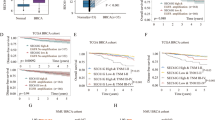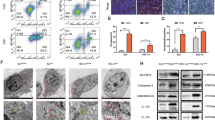Abstract
The pathogenesis of endometrial cancer (EC) involves the regulation of lactate dehydrogenases. However, the role and mechanism of lactate dehydrogenase-B (LDHB) in EC progression have not been studied. The mRNA levels of LDHB and malate dehydrogenase 2 (MDH2) were detected by quantitative real-time polymerase chain reaction. Protein expression was checked by western blotting and immunohistochemistry assays. Cell proliferation, apoptosis, and invasion were analyzed by 5-Ethynyl-2’-deoxyuridine, transwell, and flow cytometry assay, respectively. Glycolysis was investigated using Glucose Assay Kit, CheKine™ Micro Lactate Assay Kit, and ADP/ATP ratio assay kit. An in vivo tumor formation assay was conducted to disclose the effect of LDHB on tumor growth in vivo. The associations among signal transducer and activator of transcription 3 (STAT3), LDHB, and MDH2 were predicted through JASPAR or GeneMANIA online database and identified by chromatin immunoprecipitation assay, dual-luciferase reporter assay, and co-immunoprecipitation assay. LDHB expression was increased in EC tissues and cells in comparison with normal endometrial tissues and human endometrial stromal cells. LDHB had the potential as a biomarker to predict the prognosis of EC patients. In addition, LDHB knockdown inhibited the proliferation, invasion, and glycolysis and promoted apoptosis of RL95-2 and Ishikawa cells. LDHB knockdown inhibited tumor property of Ishikawa cells in vivo. STAT3 bound to the promoter region of LDHB, and STAT3 silencing-induced effects were relieved after LDHB upregulation. LDHB interacted with and regulated MDH2 expression. Moreover, MDH2 overexpression rescued LDHB knockdown-induced effects on EC cell phenotypes. STAT3-activated LDHB promoted endometrial cancer cell malignancy by inducing MDH2 production.







Similar content being viewed by others
References
Nagle, C. M., Crosbie, E. J., Brand, A., Obermair, A., Oehler, M. K., Quinn, M., Leung, Y., Spurdle, A. B., & Webb, P. M. (2018). The association between diabetes, comorbidities, body mass index and all-cause and cause-specific mortality among women with endometrial cancer. Gynecologic Oncology, 150(1), 99–105. https://doi.org/10.1016/j.ygyno.2018.04.006
Aoki, Y., Kanao, H., Wang, X., Yunokawa, M., Omatsu, K., Fusegi, A., & Takeshima, N. (2020). Adjuvant treatment of endometrial cancer today. Japanese Journal of Clinical Oncology, 50(7), 753–765. https://doi.org/10.1093/jjco/hyaa071
Braun, M. M., Overbeek-Wager, E. A., & Grumbo, R. J. (2016). Diagnosis and management of endometrial cancer. American Family Physician, 93(6), 468–474.
Siegel, R. L., Miller, K. D., Fuchs, H. E., & Jemal, A. (2021). Cancer statistics, 2021. CA: A Cancer Journal for Clinicians, 71(1), 7–33. https://doi.org/10.3322/caac.21654
Yen, T. T., Wang, T. L., Fader, A. N., Shih, I. M., & Gaillard, S. (2020). Molecular classification and emerging _targeted therapy in endometrial cancer. International Journal of Gynecological Pathology, 39(1), 26–35. https://doi.org/10.1097/pgp.0000000000000585
Urbańska, K., & Orzechowski, A. (2019). Unappreciated Role of LDHA and LDHB to Control Apoptosis and Autophagy in Tumor Cells. International Journal of Molecular Sciences. https://doi.org/10.3390/ijms20092085
Leiblich, A., Cross, S. S., Catto, J. W., Phillips, J. T., Leung, H. Y., Hamdy, F. C., & Rehman, I. (2006). Lactate dehydrogenase-B is silenced by promoter hypermethylation in human prostate cancer. Oncogene, 25(20), 2953–2960. https://doi.org/10.1038/sj.onc.1209262
Li, C., Chen, Y., Bai, P., Wang, J., Liu, Z., Wang, T., & Cai, Q. (2016). LDHB may be a significant predictor of poor prognosis in osteosarcoma. American Journal of Translational Research, 8(11), 4831–4843.
Cui, J., Quan, M., Jiang, W., Hu, H., Jiao, F., Li, N., Jin, Z., Wang, L., Wang, Y., & Wang, L. (2015). Suppressed expression of LDHB promotes pancreatic cancer progression via inducing glycolytic phenotype. Medical Oncology, 32(5), 143. https://doi.org/10.1007/s12032-015-0589-8
Zhang, D., & Yang, N. (2019). MiR-335-5p inhibits cell proliferation, migration and invasion in colorectal cancer through downregulating LDHB. Journal of B.U.ON., 24(3), 1128–1136.
Frank, A. C., Raue, R., Fuhrmann, D. C., Sirait-Fischer, E., Reuse, C., Weigert, A., Lütjohann, D., Hiller, K., Syed, S. N., & Brüne, B. (2021). Lactate dehydrogenase B regulates macrophage metabolism in the tumor microenvironment. Theranostics, 11(15), 7570–7588. https://doi.org/10.7150/thno.58380
Darnell, J. E., Jr., Kerr, I. M., & Stark, G. R. (1994). Jak-STAT pathways and transcriptional activation in response to IFNs and other extracellular signaling proteins. Science, 264(5164), 1415–1421. https://doi.org/10.1126/science.8197455
Lee, H., Jeong, A. J., & Ye, S. K. (2019). Highlighted STAT3 as a potential drug _target for cancer therapy. BMB Reports, 52(7), 415–423. https://doi.org/10.5483/BMBRep.2019.52.7.152
Wang, J. M., Jiang, J. Y., Zhang, D. L., Du, X., Wu, T., & Du, Z. X. (2021). HYOU1 facilitates proliferation, invasion and glycolysis of papillary thyroid cancer via stabilizing LDHB mRNA. Journal of Cellular and Molecular Medicine, 25(10), 4814–4825. https://doi.org/10.1111/jcmm.16453
Fu, D., Li, J., Wei, J., Zhang, Z., Luo, Y., Tan, H., & Ren, C. (2018). HMGB2 is associated with malignancy and regulates Warburg effect by _targeting LDHB and FBP1 in breast cancer. Cell Communication and Signaling: CCS, 16(1), 8. https://doi.org/10.1186/s12964-018-0219-0
Capaci, V., Arrigoni, G., Monasta, L., Aloisio, M., Rocca, G., Di Lorenzo, G., Licastro, D., Romano, F., Ricci, G., & Ura, B. (2023). Phospho-DIGE Identified Phosphoproteins Involved in Pathways Related to Tumour Growth in Endometrial Cancer. International Journal of Molecular Sciences. https://doi.org/10.3390/ijms241511987
Fatma, H., Maurya, S. K., & Siddique, H. R. (2022). Epigenetic modifications of c-MYC: Role in cancer cell reprogramming, progression and chemoresistance. Seminars in Cancer Biology, 83, 166–176. https://doi.org/10.1016/j.semcancer.2020.11.008
Liu, H., Zeng, Z., Wang, S., Li, T., Mastriani, E., Li, Q. H., Bao, H. X., Zhou, Y. J., Wang, X., Liu, Y., Liu, W., Hu, S., Gao, S., Yu, M., Qi, Y., Shen, Z., Wang, H., Gao, T., Dong, L., … Liu, S. L. (2017). Main components of pomegranate, ellagic acid and luteolin, inhibit metastasis of ovarian cancer by down-regulating MMP2 and MMP9. Cancer Biology & Therapy, 18(12), 990–999. https://doi.org/10.1080/15384047.2017.1394542
Vandel, J., Cassan, O., Lèbre, S., Lecellier, C. H., & Bréhélin, L. (2019). Probing transcription factor combinatorics in different promoter classes and in enhancers. BMC Genomics, 20(1), 103. https://doi.org/10.1186/s12864-018-5408-0
Wang, H., Huo, X., Yang, X. R., He, J., Cheng, L., Wang, N., Deng, X., Jin, H., Wang, N., Wang, C., Zhao, F., Fang, J., Yao, M., Fan, J., & Qin, W. (2017). STAT3-mediated upregulation of lncRNA HOXD-AS1 as a ceRNA facilitates liver cancer metastasis by regulating SOX4. Molecular Cancer, 16(1), 136. https://doi.org/10.1186/s12943-017-0680-1
Zhang, W., Gong, M., Zhang, W., Mo, J., Zhang, S., Zhu, Z., Wang, X., Zhang, B., Qian, W., Wu, Z., Ma, Q., & Wang, Z. (2022). Thiostrepton induces ferroptosis in pancreatic cancer cells through STAT3/GPX4 signalling. Cell Death & Disease, 13(7), 630. https://doi.org/10.1038/s41419-022-05082-3
Wang, L., Zhao, Q. F., Yang, B. B., Liang, H. J., Zhang, X. E., Zhang, X. Y., Yang, W. J., Guo, Z. Y., Xu, X., Tian, F., & Wu, Q. H. (2023). STAT3-EphA7 axis contributes to the progression of esophageal squamous cell carcinoma. Acta Oncologica, 62(12), 1757–1766. https://doi.org/10.1080/0284186x.2023.2259601
Hu, M., Yang, J., Xu, Y., & Liu, J. (2022). MDH1 and MDH2 Promote Cell Viability of Primary AT2 Cells by Increasing Glucose Uptake. Computational and Mathematical Methods in Medicine, 2022, 2023500. https://doi.org/10.1155/2022/2023500
Pei, X., Li, K. Y., Shen, Y., Li, J. T., Lei, M. Z., Fang, C. Y., Lu, H. J., Yang, H. J., Wen, W., Yin, M., Qu, J., & Lei, Q. Y. (2022). Palmitoylation of MDH2 by ZDHHC18 activates mitochondrial respiration and accelerates ovarian cancer growth. Science China Life Sciences, 65(10), 2017–2030. https://doi.org/10.1007/s11427-021-2048-2
Lo, Y. W., Lin, S. T., Chang, S. J., Chan, C. H., Lyu, K. W., Chang, J. F., May, E. W., Lin, D. Y., Chou, H. C., & Chan, H. L. (2015). Mitochondrial proteomics with siRNA knockdown to reveal ACAT1 and MDH2 in the development of doxorubicin-resistant uterine cancer. Journal of Cellular and Molecular Medicine, 19(4), 744–759. https://doi.org/10.1111/jcmm.12388
He, D., Xin, T., Pang, B., Sun, J., Liu, Z. H., Qin, Z., Ji, X. S., Yang, F., Wei, Y. B., Wang, Z. X., Gao, J. J., Pang, Q., & Liu, Q. (2022). A novel lncRNA MDHDH suppresses glioblastoma multiforme by acting as a scaffold for MDH2 and PSMA1 to regulate NAD+ metabolism and autophagy. Journal of Experimental & Clinical Cancer Research, 41(1), 349. https://doi.org/10.1186/s13046-022-02543-7
Zhuang, Y., Xiang, J., Bao, W., Sun, Y., Wang, L., Tan, M., He, Y., & Xi, X. (2017). MDH2 stimulated by estrogen-GPR30 pathway down-regulated PTEN expression promoting the proliferation and invasion of cells in endometrial cancer. Translational Oncology, 10(2), 203–210. https://doi.org/10.1016/j.tranon.2017.01.009
Li, Y., Liang, J., Tian, X., Chen, Q., Zhu, L., Wang, H., Liu, Z., Dai, X., Bian, C., & Sun, C. (2023). Intermittent fasting promotes adipocyte mitochondrial fusion through Sirt3-mediated deacetylation of Mdh2. British Journal of Nutrition, 130(9), 1473–1486. https://doi.org/10.1017/s000711452300048x
Chen, C. L., Hsieh, F. C., Lieblein, J. C., Brown, J., Chan, C., Wallace, J. A., Cheng, G., Hall, B. M., & Lin, J. (2007). Stat3 activation in human endometrial and cervical cancers. British Journal of Cancer, 96(4), 591–599. https://doi.org/10.1038/sj.bjc.6603597
Acknowledgements
None.
Funding
This work was supported by the project of Hubei Provincial Health Committee: Effect of LDHB-mediated abnormal lactic acid metabolism on type I endometrial carcinoma (WJ2023M044).
Author information
Authors and Affiliations
Corresponding author
Ethics declarations
Conflict of interest
The authors declare that they have no conflicts of interest.
Data availability
Not applicable.
Additional information
Publisher's Note
Springer Nature remains neutral with regard to jurisdictional claims in published maps and institutional affiliations.
Rights and permissions
Springer Nature or its licensor (e.g. a society or other partner) holds exclusive rights to this article under a publishing agreement with the author(s) or other rightsholder(s); author self-archiving of the accepted manuscript version of this article is solely governed by the terms of such publishing agreement and applicable law.
About this article
Cite this article
Shen, L., Wang, J., Li, Y. et al. Transcription Factor STAT3-Activated LDHB Promotes Tumor Properties of Endometrial Cancer Cells by Inducing MDH2 Expression. Mol Biotechnol (2024). https://doi.org/10.1007/s12033-024-01067-z
Received:
Accepted:
Published:
DOI: https://doi.org/10.1007/s12033-024-01067-z




